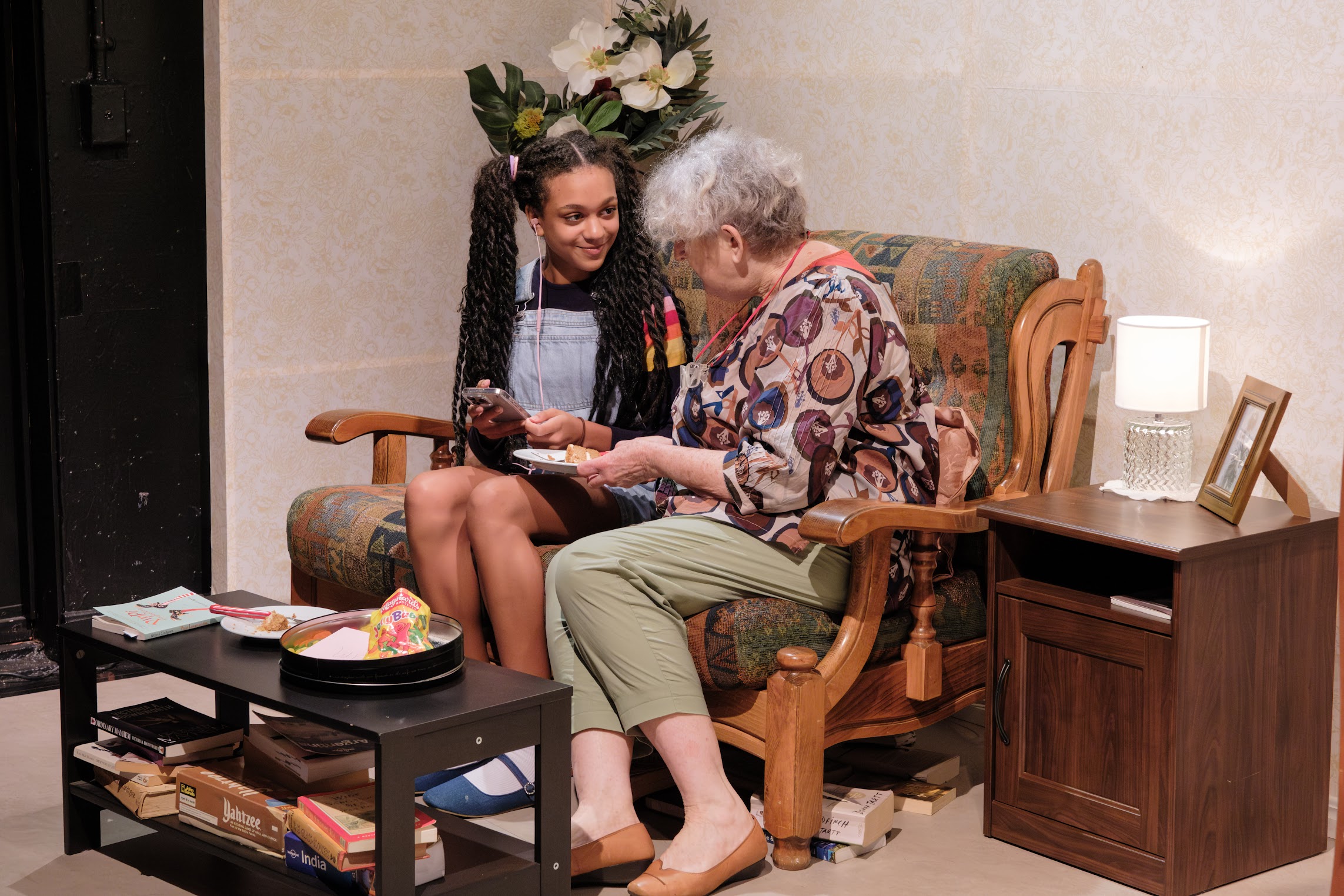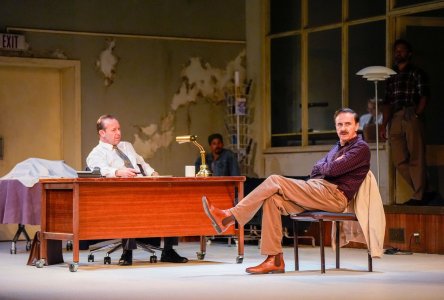
The Grenade
The Grenade, STC & MTC co-production; Drama Theatre at the Sydney Opera House, November 9-December 12, 2010. Photos: Tracey Schramm
It is really difficult to believe the same playwright is responsible for The John Wayne Principle and The Great (on the up side) and The Unlikely Prospect of Happiness, and the latest in his rollercoaster oeuvre, The Grenade, on the down side. It’s as if they were written by two different people; if it ever comes time for a bio-pic about Tony McNamara the role will surely have to go to Toni Collette.
The Grenade is a co-production between Sydney Theatre Company and Melbourne Theatre Company where it played in April-May this year. Since then it has undergone a minor cast change, with Bert Labonté coming in as Randy Savage, who could be nothing but an erotic fiction writer, but the rest remain in place: Belinda Bromilow is Sally, one-time nun, now married woman and romance writer who is branching out into erotica and is Randy’s new writing partner. Her husband, Busby McTavish, is played by the probable reason why the show was programmed in the first place: evergreen favourite comedy star Garry McDonald. Buzz is a political advisor, mover-shaker, lobbyist to an un-named female premier. His neurotic lieutenant, Whitman, supplies more sure comedy touches via Mitchell Butel. And finally, there’s Lola (terrific newcomer to Sydney Eloise Mignon) Buzz’s teenage daughter from his first marriage, who is weird, ie an extremely clever geek; and her geeky would-be boyfriend, Wheat (Gig Clarke) whose weirdness is signified first by a balaclava, then an Eraserhead pompadour.
Somewhere between Melbourne and Sydney, surgery appears to have taken place: one of the character stereotypes has disappeared. Buzz’s alcoholic, tarot-reader, ex-wife Kerry is no more. This may or may not be a good thing. As she was played by Genevieve Picot the character may have been an interesting one. But who’s to know as the play could just as well have been blown to smithereens by the device of the title – and put back together again by a tarot-reading alcoholic – so little sense does it make.
Because it was neither bad nor good, but somewhere in that fatal place in between, The Grenade is a depressing experience because as Bertolt Brecht said, “The bourgeois theatre’s performances always aim at smoothing over contradictions, at creating false harmony, at idealisation”. And this play is nothing if not bourgeois theatre. I was reminded of this because the Brecht quote comes from Alison Croggon’s TheatreNotes review – which I Googled because I was so puzzled by the play and could only think: Why? Why was it written? Why was it taken up? Why did Garry McDonald say yes? Why did so many people patiently sit through it? Etc etc.
Alison’s review, from April 2010 begins: “The Grenade is the sort of play that makes me wonder why people don’t stay home and watch Arrested Development on their widescreen TV. Television does this stuff so much better; and besides, you can order pizza.”

She goes on to muse that it could have inhabited Orton country, but doesn’t quite. And I’d add that it could have been funnier, but isn’t; it could have been more satirical, but isn’t; it could have been sharper and crueller, to better effect, but isn’t. And the end is mawkish and as puzzling as the rest. It’s not that bourgeois theatre isn’t good … but therein lies the rub. It has to be good.
When attention and praise is turned on the complex revolving set (design Richard Roberts and a well-judged and atmospheric lighting schema Matt Scott) you know there’s something wrong and it ain’t the beautifully conceived up-scale house that epitomises “edgy living”. Through clever use of the set and its various facets, director Peter Evans pretty much papers over the worst of the cracks and keeps things moving, literally and figuratively.
Nevertheless, on its opening night in Sydney the (excellent) actors resorted to a great deal of bellowing and broad gestures, which most often means a lack of faith in the text and barely concealed panic, which is depressing. And as I remain mired in gloom, I’m borrowing Alison’s final observation because I share it; although where the actors are concerned, I’m not 100% sure of the “mostly harmless” bit. However, she said:
”I couldn’t get enthusiastic about this, but I couldn’t hate it either. It is a class above most work of its kind, and will appeal to many. I’d say it was, like the description of Earth in The Hitchhiker’s Guide to the Galaxy, “mostly harmless”.



